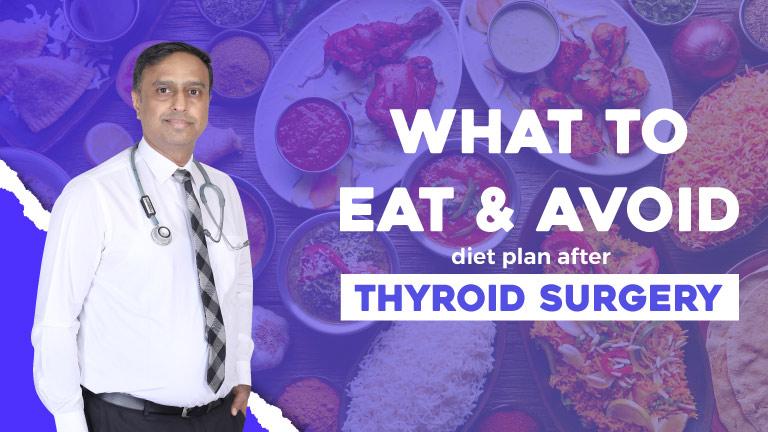A proper diet is essential after thyroid removal surgery, also known as thyroidectomy. The thyroid gland plays a crucial role in regulating metabolism and producing hormones that influence various bodily functions. After the operation, especially if the entire thyroid gland is removed, the body’s hormonal balance is disrupted, necessitating careful dietary considerations.
A well-balanced diet supports the healing process, provides necessary nutrients for tissue repair, and helps manage energy levels. Proper nutrition can also assist in maintaining a healthy weight, as thyroid function affects metabolism. Since individuals undergoing thyroidectomy often need lifelong thyroid hormone replacement medication, their diet can impact how effectively their bodies absorb and utilize these hormones. So, it’s important to follow a balanced and nutritious diet to support your recovery and overall well-being. Here’s a general diet list outlining what to eat and what to avoid:
Foods to Include in your diet after thyroid surgery:
Lean Proteins: Include sources of lean protein such as chicken, turkey, fish, eggs, tofu, legumes, and low-fat dairy. Protein is the best option to maintain muscle mass.
Whole Grains: Choose whole grains like brown rice, quinoa, whole wheat bread, and whole grain pasta for sustained energy and fiber.
Healthy Fats: Opt for sources of healthy fats like avocados, nuts, seeds, olive oil, and fatty fish (e.g., salmon, mackerel) to support immune function and heart health.
Fruits and Vegetables: Vibrantly colored fruits and vegetables are abundant sources of vitamins, minerals, and antioxidants. Opt for a diverse selection of these nutritious foods to ensure you receive essential nutrients.
Dairy or Dairy Alternatives: If you tolerate dairy well, include low-fat or non-fat dairy products for calcium and vitamin D. Otherwise, choose fortified plant-based milk alternatives.
Hydration: Drink plenty of water. Herbal teas and low-sodium broths are also good options.
Foods to Avoid or Limit after thyroid surgery:
Iodine-Rich Foods: Excessive iodine intake can interfere with thyroid function, especially if you’re taking thyroid medication. Limit iodized salt, seaweed, iodine-rich supplements, and high-iodine foods.
Sugary and Processed Foods: Reduce or avoid foods and drinks high in added sugars and refined carbohydrates, as they can lead to energy spikes and crashes.
Caffeine and alcohol: While moderate caffeine intake is generally okay, some individuals may experience sensitivity to caffeine after the operation. It’s better to avoid alcohol.
High-Fiber Foods: Initially, you might want to avoid very high-fiber foods like raw vegetables, whole seeds, and nuts, as they could potentially cause discomfort during the early stages of recovery.
Salty Foods: Limit foods high in sodium to help manage fluid balance and blood pressure.
Cruciferous Vegetables: These vegetables (e.g., broccoli, cauliflower, Brussels sprouts) contain compounds that can affect thyroid function. While they’re generally safe in moderation, excessive intake might be best avoided.
Tips for Meal Planning:
- Listen to Your Body
- Small, Frequent Meals
- Nutrient-Dense Snacks
- Thyroid Medication
- Consult a Registered Dietitian
Post-thyroid removal surgery diet menu
Here’s a sample of after thyroid surgery diet plan for a day. Remember that individual dietary needs can vary, so it’s important to consult your healthcare provider or a registered dietitian for personalized guidance based on your specific situation.
Breakfast:
- Scrambled eggs or paneer scramble (for a vegetarian option) cooked in olive oil for protein and healthy fats.
- Whole grain toast for complex carbohydrates and fiber.
- Sliced avocado for additional healthy fats and nutrients.
- Herbal tea or water for hydration.
Morning Snack:
- Greek yogurt or a dairy-free alternative for protein and calcium.
- A small handful of mixed nuts (unsalted) for healthy fats and a crunch.
Lunch:
- Grilled chicken or salad with mixed greens, cherry tomatoes, and cucumbers.
- Cooked quinoa or brown rice as a side for sustained energy and fiber.
- Sliced fruit (e.g., berries, apple) for a refreshing touch.
Afternoon Snack:
- Carrot and celery sticks with hummus for a crunchy and nutritious snack.
- Herbal tea or water for hydration.
Dinner:
- Plant-based protein sources like lentils or beans for protein and omega-3 fatty acids.
- Steamed or roasted vegetables (e.g., broccoli, carrots, cauliflower) for vitamins and minerals.
- Mashed sweet potatoes or whole grain pasta for complex carbohydrates.
- Herbal tea or water for hydration.
Evening Snack:
- A small serving of cottage cheese or a dairy-free alternative for a protein-rich option before bedtime.
- Sliced fruit (e.g., pineapple, melon) for a touch of sweetness.
Hydration:
- Throughout the day, aim to drink plenty of water, herbal teas, and other hydrating beverages.






